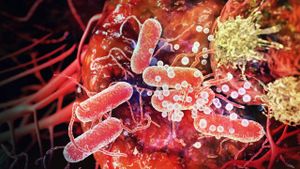Antimicrobial resistance (AMR) is quietly becoming one of the most severe public health threats of our era, and it’s not something to be taken lightly. Microorganisms, including bacteria, viruses, fungi, and parasites, are adapting and becoming resistant to the drugs we rely on to combat infections. This transformation is turning routine treatments, which once seemed straightforward, complicated and challenging. The growing problem is leaving public health systems around the globe grappling with resurgent diseases once considered easily treatable.
The origin of this crisis is rooted mainly in the misuse and overuse of antibiotics. Practices like sharing medications, not following healthcare providers' instructions, and self-medicative behaviors are all accelerating the rise of AMR. Dr. Felix Walakira, an AMR expert from Makerere University, underscored this concern during media training for World AMR Awareness Week. He pointed out the dangerous habit of stopping medication after just one or two days, which allows resistant microorganisms to adapt, making future treatment options ineffective. "Some swallow medicine for one or two days, and when they feel okay, they stop. This is not right," he cautioned.
The consequences of AMR are devastating. Currently, it contributes to approximately 4.95 million deaths worldwide each year—a figure that's projected to grow if immediate interventions are not put in place. According to Dr. Walakira, AMR results not only in prolonged hospital stays but also entails higher healthcare costs, lost productivity, and longer recovery times. “AMR leads to prolonged hospitalization, longer recovery times, resistant organisms, death, increased healthcare costs, and lost productivity,” he elaborated.
Poor informed decision-making is also part of this troubling puzzle. Dr. Stella Nanyonga emphasized the power of knowledge. She highlights the importance of asking questions about medications: "Knowledge is power," she stated. Nanyonga urges patients to be proactive, especially when they haven’t been tested. "When you have not been tested, have the knowledge to ask the pharmacist why you're being prescribed three antibiotics," she noted.
Self-diagnosis and reliance on anecdotal advice can exacerbate the AMR crisis. The idea of parents as the go-to medical experts dissuades many from seeking professional help when ill. Dr. Walakira commented on this alarming trend, adding, "At home, people find parents as their specialists, and so they don’t go to hospitals when they get unwell." Easy access to over-the-counter antibiotics adds to the mix, creating circumstances ripe for resistant infections to thrive.
The World Health Organization (WHO) ranks AMR as one of the top ten global health threats. Health experts stress the necessity for public awareness, responsible antibiotic usage, and strong healthcare systems to tackle this issue. If we do not act together, AMR could reverse decades of medical progress.
A recent study from South Africa highlights another facet of AMR. Researchers found houseflies near hospices capable of carrying bacteria, some of which showcased antibiotic resistance. The study, covering three hospices, revealed these flies amplify the risk of spreading harmful microorganisms. Given their propensity to travel and thrive near decaying organic materials, houseflies could become significant players in the AMR threat. The researchers remarked, "A single housefly can carry enough bacteria to cause disastrous infections like cholera and tuberculosis."
The study used advanced DNA sequencing methods to explore the diversity of microorganisms linked to these flies, which carried considerable bacterial communities exhibiting antibiotic-resistant genes.
With increasing AMR rates, the agricultural sector, especially livestock farming, is also under scrutiny. The overuse of antibiotics to prevent illness among animals is contributing to the increasing instances of antibiotic resistance. This excess is not confined to livestock; the impact permeates the community, showing up even among hospitalized patients. The presence of resistant bacteria raises alarming concerns for patients with compromised immune systems.
Professor Dr. Sadequr Rahman from Monash University Malaysia pointed out the necessity of innovatively addressing the AMR crisis. He noted the importance of completing prescribed antibiotic courses instead of stopping when one starts to feel well. This behavior leads to the survival of more resilient bacteria, creating more significant resistance issues down the road.
Dr. Rahman also proposes seeking out new antibiotics from natural resources, including ecosystems like rainforests where diverse strains of bacteria could hold promise for developing new treatments. His colleague has already discovered antibiotics from this environment, showcasing the potential to combat resistant bacteria. Meanwhile, the development of aptamers—molecules engineered to adhere to bacterial cell components—may provide another approach to tackle resistant strains. Supplementing traditional antibiotics with these aptamers could bolster their efficacy.
The collective actions needed may feel monumental, but they start at the individual level. The consumer responsibility involved should include using antibiotics strictly when necessary and adhering to healthcare providers' directions. Meanwhile, researchers and scientists are charged with developing new treatment strategies and discovering natural antibiotic sources to bolster defenses against these resilient microbes.
Urgent action is also needed on the regulatory front. Dr. Soumya Swaminathan, the former chief scientist of WHO, noted during her discussions on antibiotic misuse during the pandemic, indicating people should refrain from taking antibiotics for minor illnesses like colds. "Instead, use paracetamol and natural remedies as alternatives for viral infections," she recommended. The challenge becomes more acute when governments and pharmacies exercise stricter control over antibiotic distribution.
Lastly, the conversation around AMR is also gaining traction globally. A public walk recently held in Vientiane by Laos' health authorities and various stakeholders spotlighted the commitment to combat AMR, emphasizing the dire need for increased awareness worldwide. With at least 700,000 annual global deaths attributed to AMR, solutions must be prioritized to avert the anticipated increase to 10 million by 2050.
The AMR crisis is one of humanity’s most pressing challenges. It requires concerted efforts from health professionals, researchers, policymakers, and individuals alike to forge pathways toward sustainability and health. Without our proactive participation, the consequences could dramatically alter healthcare landscapes for generations to come.



